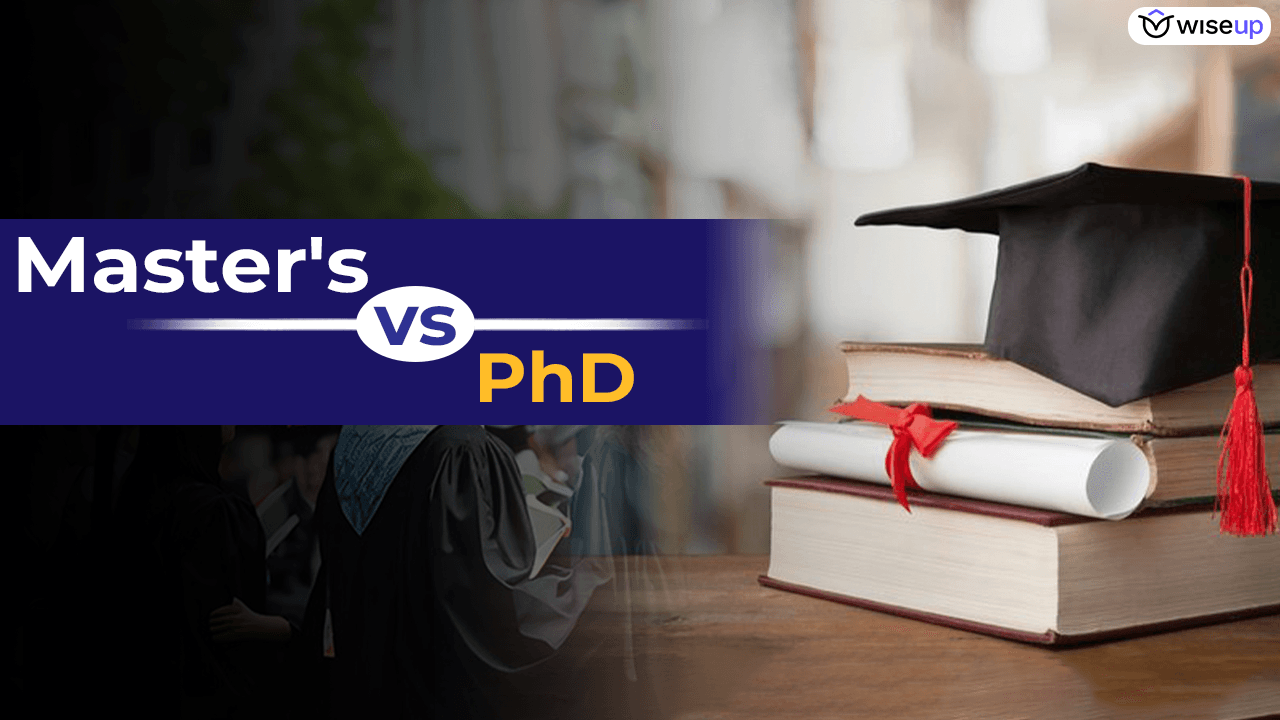Deciding between a Master’s and a PhD when planning to study abroad can be challenging. A Master’s program is shorter and offers quicker job prospects, while a PhD involves a longer commitment but often comes with scholarships. In this blog, we’ll explore five key factors to help you choose the option that best aligns with your goals and career aspirations.
1. Career Goals: What Do You Want to Achieve?
Your career aspirations should be the foundation of your decision. The degree you choose will directly impact the opportunities available to you and the trajectory of your career.
PhD for Academic and Research Careers:
If you aspire to become a professor, lead groundbreaking research, or stay in academia long-term, a PhD is non-negotiable.
Academic roles, particularly in universities and research institutions, require a deep understanding of your field, which only a PhD can provide.
Additionally, a PhD equips you with the skills to publish research papers, write grant proposals, and mentor students—key requirements for an academic career.

Master’s for Industry and Practical Application:
If your primary goal is to improve your qualifications and unlock better job opportunities in the industry, a master’s degree might be all you need.
Many industries value specialized knowledge that a master’s program provides, but they may not require the in-depth research skills that come with a PhD.
For example, roles in data science, product management, or consulting often prioritize practical expertise over research credentials.

Key Action Point: Research the industry or field you want to enter. Study job descriptions, qualifications required, and career growth paths. Speak to professionals in your desired roles to understand what qualifications have been most beneficial for them.
2. Investment: Balancing Time and Money
One of the most significant differences between a master’s and a PhD is the investment required in terms of time and money.
PhD: A Long-Term Commitment of Time but Minimal Financial Cost
Pursuing a PhD typically takes 4–5 years or more, depending on the research field and institution.
While this is a substantial time commitment, the financial burden is often minimal. Most PhD programs offer full scholarships, covering tuition fees, and provide stipends that cover basic living expenses.
This makes a PhD a financially viable option, especially for those who may not have the means to fund their education upfront.
Master’s: A Shorter Commitment with Higher Financial Costs
In contrast, a master’s degree can often be completed in 1–2 years, which means you can enter the workforce sooner.
However, the financial investment is significantly higher. Tuition fees for master’s programs abroad can range from ₹20–30 lakhs or more, and scholarships for master’s students are less common.
While part-time jobs can help cover living expenses, they are not guaranteed and may not offset tuition fees entirely.
Key Question: Which resource is more precious to you—time or money? For example, I chose a master’s because I wanted to start my career earlier and achieve financial independence by my late 20s. A PhD, while prestigious, would have delayed my entry into the workforce and financial stability.
To learn more about this, check out the video below:
3. Commitment: Are You Ready for the Journey?
The level of commitment required for a PhD is vastly different from that of a master’s program. Understanding what each entails can help you gauge your readiness.
PhD: A Test of Perseverance
A PhD is not just an academic program; it’s a test of endurance, motivation, and passion.
You will spend years conducting original research, facing setbacks, and pushing boundaries in your field.
It can be mentally and emotionally taxing, especially when experiments fail or research doesn’t yield expected results. You need to have a clear vision and unwavering dedication to persevere.

Master’s: A Structured and Shorter Journey
A master’s program is more structured and less demanding.
It builds on your undergraduate knowledge and provides advanced skills to prepare you for the workforce. While challenging, it lacks the intensity of independent research, making it a more manageable option for many students.
Key Insight: Reflect on your ability to stay committed to long-term goals. If you’re someone who thrives on structure and prefers clear outcomes, a master’s may suit you better. On the other hand, if you’re deeply passionate about solving complex problems and contributing to knowledge, a PhD could be the right fit.
4. Rewards: What Will You Gain?
The rewards of each degree go beyond monetary benefits and extend to recognition, career growth, and personal fulfillment.
PhD: Recognition and Legacy
Completing a PhD earns you the prestigious title of “Doctor.” It signifies your expertise and dedication to advancing human knowledge.
Your research contributes to your field, creating a lasting legacy through published papers and discoveries.
Additionally, a PhD often sets you apart in leadership positions, as companies value the intellectual credibility it brings.

Master’s: Practical and Immediate Gains
While a master’s doesn’t offer the same level of societal recognition, it provides practical skills and advanced knowledge that can help you quickly climb the professional ladder. It’s an efficient way to enhance your qualifications and secure higher-paying roles.
Key Takeaway: Consider what motivates you more—societal respect and a lasting legacy or immediate career advancement and financial gains.
5. Earnings Potential: Who Earns More?
The financial benefits of a PhD versus a master’s depend largely on the career path you choose.
Academia:
In academic roles, PhD holders generally earn more than those with a master’s degree. Their expertise and research contributions justify the higher pay scale.
Industry:
In corporate or industry roles, the earnings gap between a master’s and a PhD often narrows over time. While PhD graduates may start with higher salaries, master’s degree holders can quickly catch up or even surpass them with experience, performance, and skill development.
Key Insight: Salary growth is influenced more by your skills, contributions, and career choices than by your degree alone. Evaluate your long-term financial goals and how they align with your chosen path.
This summary table below provides a concise comparison of the key factors to help you evaluate which degree aligns better with your goals and priorities.
| Parameter | Master’s | PhD |
|---|---|---|
| Career Goals | – Ideal for industry roles requiring advanced skills. | – Essential for academic, research, or professor roles. |
| – Suitable for jobs not focused on deep research. | – Focused on contributing original research to your field. | |
| Time Investment | – 1–2 years (short duration). | – 4–5+ years (long duration). |
| – Quicker entry into the workforce. | – Delayed entry into the workforce but provides expertise. | |
| Financial Cost | – High upfront costs (₹20–30 lakhs or more abroad). | – Minimal cost; most programs are fully funded with stipends. |
| – Scholarships are rare. | – Living expenses often covered through stipends. | |
| Commitment Level | – Moderate; coursework-focused with small projects. | – High; involves years of in-depth research and resilience. |
| – More structured and manageable. | – Requires self-motivation, persistence, and adaptability. | |
| Rewards | – Immediate career advancement and skill improvement. | – Prestigious “Doctor” title, lasting legacy through research. |
| – Focuses on practical applications. | – Recognized as a leader or expert in your field. | |
| Earnings Potential | – Competitive salary growth based on performance and skills. | – Higher starting salary but depends on the chosen field. |
| – Often matches or surpasses PhD holders’ salaries in the industry over time. | – Higher earnings in academia compared to master’s graduates. |
Both a master’s and a PhD have their own advantages and challenges. The right choice depends on your career aspirations, personal circumstances, and the level of commitment you’re ready to make.
Take the time to weigh your options, speak to professionals in your field, and reflect on what matters most to you.
If you need assistance to learn how to write your admission essays (SOPs, LORs, Scholarship Essays) then do register for our course – Write your Way to Study Abroad. If you have already written your SOP and want to get it reviewed then do register for our – SOP Review Program.
Wishing you success and fulfillment in your academic and professional journey! 😊





